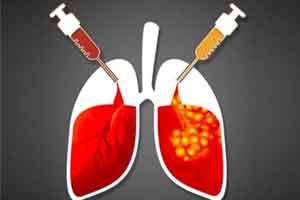- Home
- Editorial
- News
- Practice Guidelines
- Anesthesiology Guidelines
- Cancer Guidelines
- Cardiac Sciences Guidelines
- Critical Care Guidelines
- Dentistry Guidelines
- Dermatology Guidelines
- Diabetes and Endo Guidelines
- Diagnostics Guidelines
- ENT Guidelines
- Featured Practice Guidelines
- Gastroenterology Guidelines
- Geriatrics Guidelines
- Medicine Guidelines
- Nephrology Guidelines
- Neurosciences Guidelines
- Obs and Gynae Guidelines
- Ophthalmology Guidelines
- Orthopaedics Guidelines
- Paediatrics Guidelines
- Psychiatry Guidelines
- Pulmonology Guidelines
- Radiology Guidelines
- Surgery Guidelines
- Urology Guidelines
Concurrent HIV and MDR-tuberculosis treatment leads to better cure rate,survival

Dr.Neel R. Gandhi, MD, associate professor at the Emory Rollins School of Public Health and the Emory School of Medicine and associates have found in a study that Patients co-infected with HIV and multidrug-resistant tuberculosis (MDR-TB) can achieve similar survival and tuberculosis cure rates to those infected with MDR-TB but not HIV when treated concurrently for both infections.The new study has been published in the journal Clinical Infectious Diseases.
The researchers enrolled 206 MDR-TB patients—both with and without HIV—receiving standardized HIV and MDR-TB treatment regimens in South Africa between 2011 and 2015. They studied rates of survival, tuberculosis cure rates, adverse effects of both treatments, changes in CD4 counts (measurement of T-cells in the bloodstream), and HIV treatment outcomes among both groups.
Although previous studies—in which HIV treatment was not universally available for HIV co-infected patients—showed substantially higher rates of death among HIV co-infected MDR-TB patients, the current study found that survival was similar between HIV co-infected and HIV-negative participants when patients were treated for both diseases concurrently. Only a group of participants with low baseline CD4 counts, whose CD4 counts remained low despite receiving HIV treatment, continued to have dramatically higher mortality rates. In contrast, participants with low baseline CD4 counts whose CD4 counts increased with HIV treatment achieved similar survival rates to those enrolled in the study without HIV.
The study also found that there was no difference in adverse events or adherence to treatment between the groups of participants, even though the HIV co-infected participants had the additional pill burden of taking medications for both HIV and MDR-TB.
"Although the World Health Organization currently recommends concurrent treatment of MDR-TB and HIV for co-infected patients, there have not been prospective data to support that recommendation until now," says Gandhi. "Our study provides high-quality data to support the concurrent treatment for MDR-TB/HIV co-infected patients globally.

Disclaimer: This site is primarily intended for healthcare professionals. Any content/information on this website does not replace the advice of medical and/or health professionals and should not be construed as medical/diagnostic advice/endorsement or prescription. Use of this site is subject to our terms of use, privacy policy, advertisement policy. © 2020 Minerva Medical Treatment Pvt Ltd